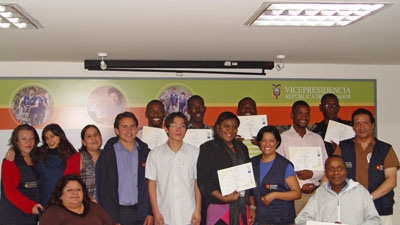What may Ecuador teach Haiti on the disability matter? This and other questions were answered during the recent visit that an Haitian delegation paid to Quito and Manta, where they have seen first-hand, how the program for the inclusion of persons with disabilities work in the job market.
Programs, such as the Manuela Espejo Mission and the Labor Inclusion Service (SIL/LIS) were used as examples to see Ecuador’s outcome on disability matters. Approximately between 2006 and 2012, ten (10) thousand persons with different types of disabilities have been successfully inserted into Ecuador’s job market.
In Manta, that is located on Ecuador’s coastline, the delegation visited several microbusiness leadered by persons with physical, hearing, and seeing disabilities. That is the case of a cyber-café, where several services besides internet are offered and a workshop, where handcrafts are made with the Tagua seed (palm tree seed), also known as either ivory nut, or vegetable ivory.
Both in Manta and Quito, the Labor Inclusion Service allows that individuals with different disabilities work in different places on a regular manner. This service offers training, advisory, and support throughout the whole process of the job insertion
For Ms María Ana Cedeño, coordinator of the Labor Inclusion Service, this was a very enriching experience for the countries. “This is the first time that we have had the opportunity that such a large delegation visited us and that for a two-week period we have been able to share our day-to-day work”, she informed.
Mr David Charles, the Bank’s coordinator of equipment adapted from Haiti travelled together with: Guerline Dardignac, director of the delegation, Anel Lavard, Fritz Osner Saint-Paul, Pierre Renerl Moise, Louis Arlext and Joacyne Marseille, all of them members of the Office of the Secretary of State for the inclusion of persons with disabilities.

